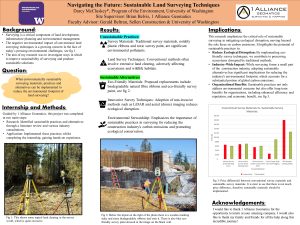Navigating the Future: Sustainable Land Surveying Techniques
Traditional land surveying practices, while essential for land development and mapping, can exert a significant and often adverse impact on the environment, particularly in ecologically sensitive areas like wetlands and wildlife habitats. This paper serves as a bridge between the knowledge acquired during my internship and the subsequent synthesis of sustainable surveying practices in these fragile ecosystems. Motivated by the pressing environmental concerns associated with conventional land surveying techniques, this project aims to develop a comprehensive framework of environmentally sustainable surveying methods through rigorous research and hands-on experience. The focal point remains the reduction of land surveying activities environmental footprint within sensitive regions, with a particular emphasis on wetlands and wildlife habitats. Drawing from fieldwork, academic research, and real-world applications, this synthesis paper will provide a cohesive compilation of environmentally sustainable surveying techniques. This knowledge will serve as a valuable resource for professionals and organizations involved in land surveying, offering practical solutions to reduce the environmental impact of their activities. The research represents an integration of learned practices and emerging technologies that have the potential to make a substantial environmental difference in surveying operations. Ultimately, I aim to bridge the gap between the necessity for accurate geospatial data and the critical need for environmental preservation in ecologically delicate regions. By highlighting the significance of eco-conscious surveying practices and providing practical insights into their implementation, it offers a path forward for a more sustainable and harmonious coexistence between land surveying and the environment.
